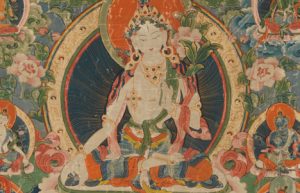 Buddhism in Tibet Syllabus
Buddhism in Tibet Syllabus
Tibetan Buddhism is a diverse religious, philosophical and cultural tradition. This course will focus on the topic of karma and the ramifications that karma theory has on how Tibetan Buddhists view meditation, ethics, sexuality and death. We will explore Tibetan Buddhism’s contradictory and complementary forms as it appears in monastic Buddhism and tantric formulations outside the monastery.
This course will center on the exploration of religious narratives. For students new to the study of Buddhism, narrative provides an engaging anchor to wade into the cross-currents of religion, culture and context. We will read stories of transformations, a prince who became an ascetic, a murderer who became a monk and a woman who became teacher and treasure revealer in a male dominated community. For reading assignments, we will rely on translated narratives as primary sources. The narratives will facilitate an exploration of Buddhist doctrines as they manifest in biographies and legends. To highlight historical and cultural contexts, these narratives will be interwoven with secondary scholarship and philosophical treatises.
Narrative is an ideal medium for the study of religion because it provides evidence for how lives are interwoven with the shared representations of their society and religion. Narratives make claims on its audience by summoning ethical responses, which gives us opportunity to discuss how the themes relate to personal views and problems facing humanity. Click Here for the Full Syllabus https://kalicape.com/buddhism-in-tibet/

Theories and Methods in the Study of Religion Syllabus
How we think about religion has been shaped by a long and violent history, much of it rooted in European colonialism. Therefore, this course locates the study of religion within key issues such as race, gender, whiteness and the European historical development of colonialism, writings on intersectionality, modernity, postmodernism, indigeneity and Islamophobia. This course trains students to think carefully and critically about religion based on interdisciplinary approaches, engaging history, philosophy, sociology, psychology, anthropology and hermeneutics. It explores landmark texts in religious studies and key themes framing religious studies. It relies primarily upon reading and class discussions, but this is supplemented by other learning aids including, listening to podcasts, watching documentaries and looking at religious art. Click Here for the Full Syllabus: https://kalicape.com/theories-and-methods/
________________________________________________________
Women in Chinese Religions Syllabus

This course examines elements of Chinese religious thought and activities as they appear within narratives about women. In order to introduce varieties of Chinese literature, the course will cover women in early China, in Confucian thought, in Daoism and Buddhism from the Han through the Tang dynasty. As the above quotation from Cahill suggests, taking ma
rginal figures as a lens to study culture can expose themes that would otherwise remain invisible. We will examine the complex negotiation between religious and philosophical ideals and women’s lives. While themes of female lives such as motherhood, sexuality and fertility may at times be viewed positively, women in Chinese religious literature were clearly subject to inferior status and suppression. However, despite limitations of a patriarchal and patrilineal society, they negotiated with these elements and thus were agents within their sphere of influence. Click
Here for the Full Syllabus: https://kalicape.com/women-in-chinese-religions-annotated/